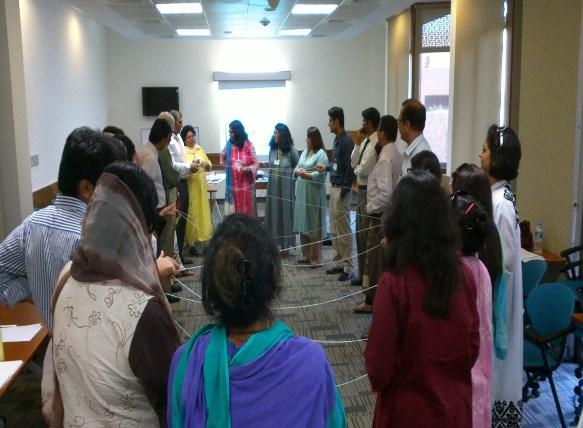It’s all about context
I didn’t grow up saying I wanted to be a Quality Assurance Officer or an Educational Developer in a university. I’m not sure these positions even existed when I went to university and I suspect I’m not the only one of us who find ourselves in these roles. And yet once we are, we seem not to let go. The gains in improvements for student learning far outweigh the struggles we face in flying the under-appreciated flag for teaching!
In the last five years, my team and I have been riding a rollercoaster to establish a Network of Quality, Teaching and Learning (QTL_net) at an international university with integrated campuses across Asia, Africa and the UK. Working across three continents, six countries and 13 teaching sites, a ‘Network’ rather than a ‘Centre’ was our only viable option. The ride, however, was lonely in a part of the world where access and not quality has been the driver, whether that be to faculty who have gained PhDs or students completing high school to enter university. The tradition of quality assurance and improvement or support for faculty on teaching was non-existent in East Africa and Pakistan five years ago. Attempts therefore to hire educational developers or instructional designers were met with silence.

Casting a net
Whilst what we were trying to do in Africa or Asia may have been new, it certainly was not in North America or the UK. Whilst higher education is now viewed more as a business with the increasing cost of fees in the West (Barnett, 1997), thankfully academics there still believe in the ethos of sharing and service. And thus we sought mentors to help build our capacities in the areas of quality, teaching and learning through our partner universities as well as the Montreal based NGO, Academics without Borders (AWB). Over the past five years, over a dozen senior academics have shared their time and knowledge to support us with teaching with technology, educational development, PhD supervision, quality enhancement, curriculum review and the scholarship of teaching and learning. A few initial weeks or months of commitment by these AWB volunteers have turned into lasting relationships with multiple mentoring visits over years to build and embed capacity.
Building a web
With our thirst to learn we lapped up the opportunities provided by this network of voluntary support received, not to transplant but to test and adapt what was possible in our context. Volunteers from more established universities than our own were surprised how our small size and senior management support provided agility to institutionally embed Canadian certified programmes such as the Instructional Skills workshop and Rethinking Teaching course redesign workshop for our faculty. An unintended consequence of the QTL_net was the silos it broke, working across geographies and disciplines. Indeed, evaluations showed that faculty came to the ‘network’ because they appreciated the peer-learning across other faculties and were more confident to practice new teaching methods in front of colleagues who didn’t work directly with them, feeling less judged. Within five years, 60% of faculty across our various geographic sites had engaged with us and we required an increasing pool of peer mentors to cope with this unprecedented demand. It was at this time that our relationship with Advance HE began. The UKPSF provided us an international benchmark to meet and the Fellowships an incentive to transform teaching. Through the process of becoming the first accredited provider in Pakistan and East Africa the support and mentors we have come across through Advance HE staff, moderators, trainers and now access to the thousands of Fellows through Advance HE Connect has given us confidence that we are on the right path and has made this journey much less lonely.
Reining YOU in!
It is through the Advance HE (UK) Fellows network I was asked as a PFHEA and an accredited provider outside the UK to sit on a panel this month for the Global Webinar on Professionalising Teaching in HE. As I sat at midnight my time, sharing my reflections to the 50 or more participants, I was struck by how common our issues were as we strive to build an institutional teaching culture. I was also a touch envious to see how where there was a critical mass of accredited providers, such as in the UK and Australia, there were so many more opportunities to learn from each other or meet gaps in capacity. How I wished that I had access to more SFHEAs, Assessors and Reviewers to run our own CPD scheme! I couldn’t have wished for more, for a week later I received a very generous offer from a participant at the Global Webinar who had heard me speak to provide pro-bono mentorship to three female educational leaders at my institution to gain SFHEA. The power of technology brings proximity across distance. So as you plan your next networking event to enhance teaching, be it in the UK or Australia, might you consider using Zoom to connect us across the ether? We have a lot to gain and a lot to share.
Tashmin Khamis is the Associate Vice Provost for Quality, Teaching and Learning at The Aga Khan University and has pioneered the HEA Fellowship scheme in Pakistan and East Africa. She served on HEA’s Quality Advisory Board and on the Advance HE Global Teaching Excellence Award. For more information on the Networks of Quality, Teaching and Learning visit https://www.aku.edu/qtl/ or register for their upcoming SoTL conference on Evidencing Teaching Practices for Effective Learning in HE www.aku.edu/sotlc
Explore Advance HE Connect, the online network exclusively for higher education.